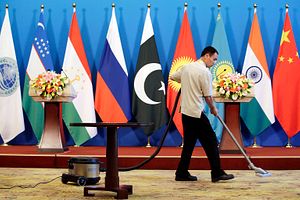In June the heads of state of the Shanghai Cooperation Organization (SCO) will gather in Qingdao to mark the group’s 18th anniversary. It is the fourth time that the annual summit has been held in China, and the first outside of Shanghai (2001 and 2006) and Beijing (2012). After nearly two decades, the international organization now boasts eight full members, four observers, and six “dialogue partners;” a permanent secretariat in Beijing; and a security outpost in Tashkent. The SCO presents itself as a multilateral organization of equal and diverse sovereign members, but China has been the driving force in its evolution, making the Qingdao summit an important moment to reflect on the organization’s trajectory, achievements, and enduring challenges.
Eighteen years after its founding, the SCO remains the object of regular geopolitical intrigue, unverified speculation, and at times hyperbolic commentary among Western and non-Western analysts. The organization, despite its mostly regional Central Asian focus, is often referred to as the most populous multilateral organization in the world, a pioneer in the rise of non-Western arenas for global governance, and even a new paradigm of international relations. Yet, many of the organization’s high-profile initiatives continue to be aspirational and unfilled – especially in the area of economic and energy cooperation – while the organization’s strong norm of consensus effectively means that the body is rarely used to “problem-solve” or host contentious debates among its members.
A careful analysis of the SCO’s history reveals that although the organization is important to both China and Russia, the two largest founding members differ over the organization’s exact purpose and scope.
As a result, from its very first months, the organization has mostly reacted to, as opposed to driven, regional events and geopolitical developments. Maintaining the organization’s successful reputation, securing external partnerships, and heightening its international prestige have themselves become enduring goals, while its members have downplayed internal politicking, member disagreements, and unfulfilled agendas.

































